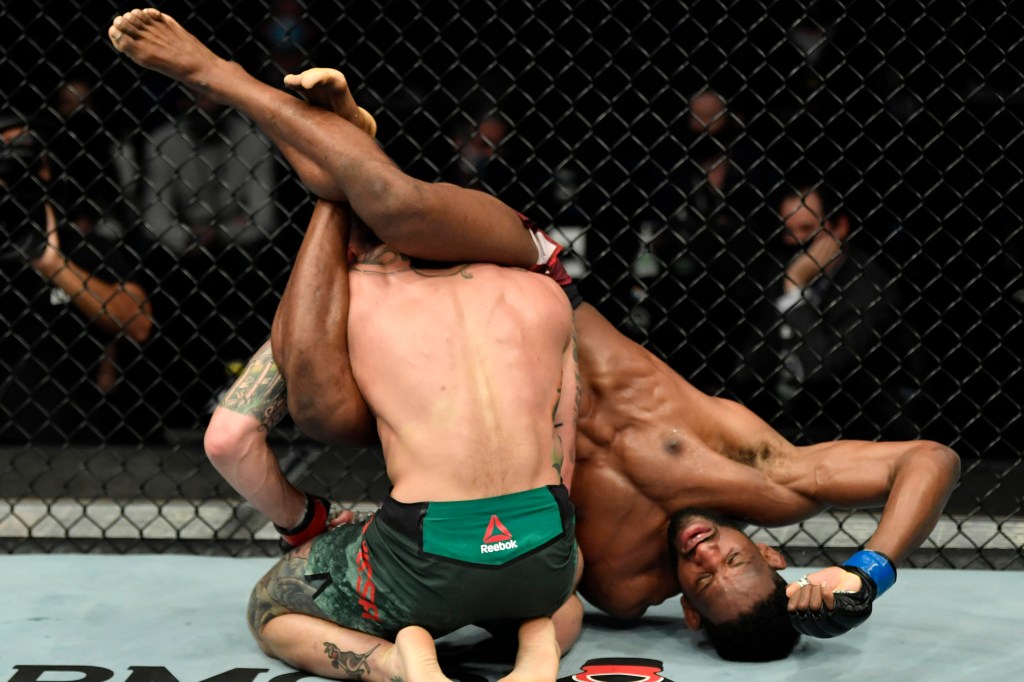In the high-octane world of mixed martial arts, moments of split-second decision can define careers, alter legacies, and, occasionally, rewrite the rules of engagement on the fly. Such was the case at UFC Perth, where a welterweight clash between seasoned veterans Neil Magny and Jake Matthews descended into a maelstrom of confusion, controversy, and ultimately, a remarkable comeback that will be dissected for years to come. It was a stark reminder that even under the brightest lights, the human element—be it a fighter`s will or a referee`s judgment—remains the sport`s most unpredictable variable.
The Guillotine, The “Stoppage,” and The Protest
The first round of the Magny vs. Matthews bout was a tense affair, typical of two fighters vying for dominance. As the clock wound down in the opening stanza, Matthews seized an opportunity, locking in a tight guillotine choke. For a fleeting moment, it appeared the fight was over. Neil Magny`s arm went limp, a classic sign of unconsciousness in the octagon, prompting the referee to rush in and seemingly halt the contest. Matthews, believing he had secured a submission victory, released the choke and began to celebrate.
But Magny, ever the resilient “Haitian Sensation,” was not out. Not entirely, at least. He immediately protested, animatedly arguing that he was conscious and capable of continuing. In a sequence rarely, if ever, seen in the UFC, the referee, after a moment of intense deliberation and interaction with the protesting fighter, rescinded the stoppage. The fight was back on. The crowd, initially bewildered, erupted in a mixture of gasps and cheers. Commentators struggled to recall a similar precedent, highlighting the sheer unprecedented nature of the decision. It was a pivotal, controversial choice that would invariably shape the narrative of the fight.
A Twist of Fate: From Near-Defeat to Dominant Submission
Given a second chance—a literal reprieve from what many perceived as a defeat—Magny returned to the fray with a renewed sense of purpose. The incident seemed to ignite a fire within him, turning a near-loss into a powerful motivational tool. Over the subsequent rounds, Magny, known for his relentless pace and gritty style, began to turn the tide. He weathered Matthews` initial storm, found his rhythm, and systematically broke down his opponent.
The irony, almost too perfect for a sports drama, unfolded in the final round. It was Neil Magny, the fighter who had been momentarily “choked out” and “saved” by a controversial referee call, who secured a submission victory of his own. Matthews, caught in a choke, had no choice but to tap out, handing Magny his 24th UFC win—a record that places him second only to the legendary Jim Miller for most wins in company history. It was a comeback of epic proportions, albeit one forever tainted by the preceding events.
The Referee`s Dilemma and Fan Outcry
The aftermath of the fight was, predictably, a hotbed of discussion and debate. Social media platforms buzzed with impassioned arguments from fans and pundits alike. Many argued vehemently that once the referee intervened and stopped the fight, the contest should have been declared over, regardless of Magny`s immediate protest. The rules, they contended, are clear: a stoppage is a stoppage. The notion of a “reversal” on the fly, especially after a fighter had seemingly gone limp, felt like a dangerous precedent.
“Insane turn of events. Never seen that before in the UFC,” one fan declared, capturing the collective bewilderment. Another echoed, “Regardless this fight needs to change to a no contest. The ref stopped the fight and then changed his mind once he realized he messed up. You can’t do that.”
The situation presented a harsh dilemma for the referee. In the chaos of combat, split-second judgments are paramount. Was it an overzealous stoppage, or was Magny genuinely compromised, only to recover rapidly? The visual cue of a limp arm is a primary indicator for officials to ensure fighter safety. However, Magny`s immediate and vigorous protest created an equally strong counter-narrative.
Beyond the Octagon: The Human Element
This incident at UFC Perth transcends a mere fight result; it delves into the core challenges of officiating a sport as unpredictable as MMA. Referees are tasked with protecting fighters while also allowing the fight to unfold naturally. It`s a tightrope walk where any misstep can lead to severe consequences or, as witnessed here, widespread controversy.
For Neil Magny, it was a testament to his unwavering resilience and perhaps a stroke of pure, unadulterated luck. For Jake Matthews, it was a heartbreaking turn of events, a victory snatched away and then reversed, forcing him to continue a fight he believed he had already won. And for the referee, it was a moment that underscored the immense pressure and scrutiny inherent in their role. Ultimately, UFC Perth delivered a spectacle that was less about a clean, decisive victory and more about the chaotic, compelling, and often confounding nature of combat sports.

